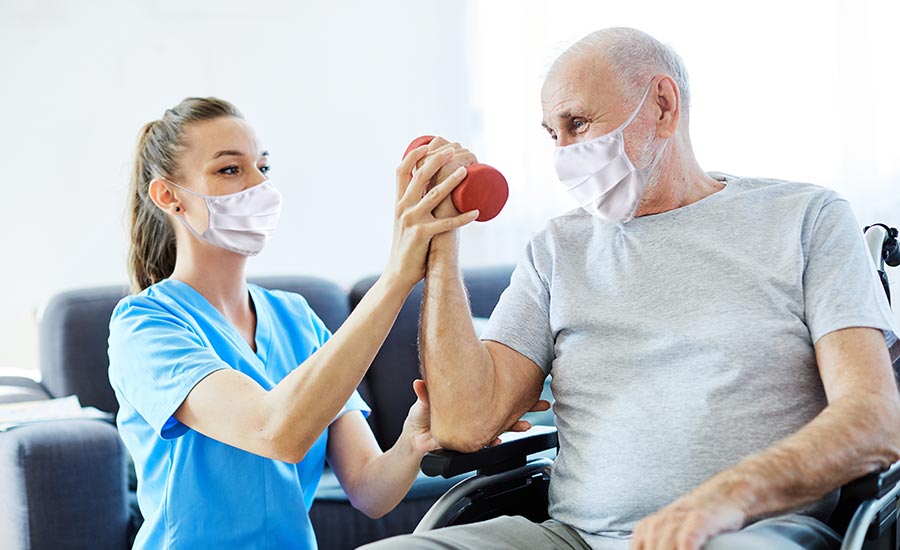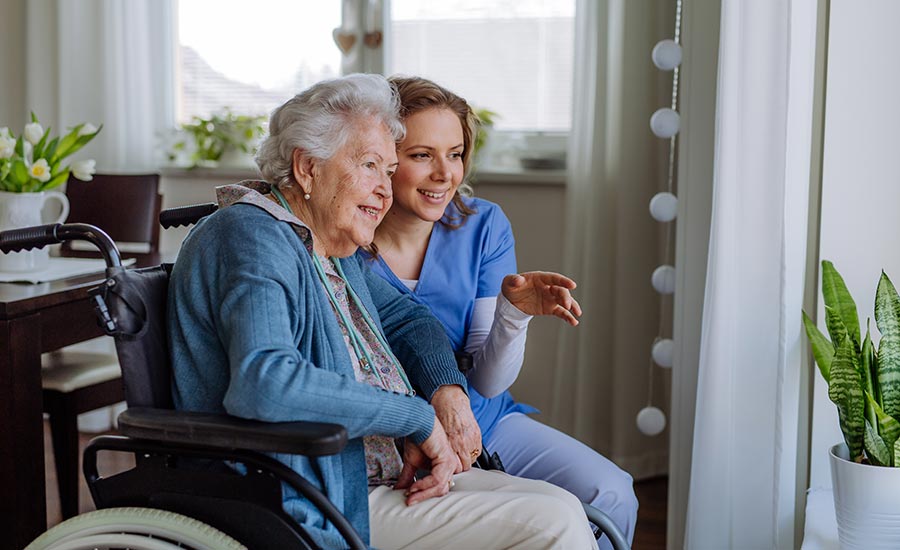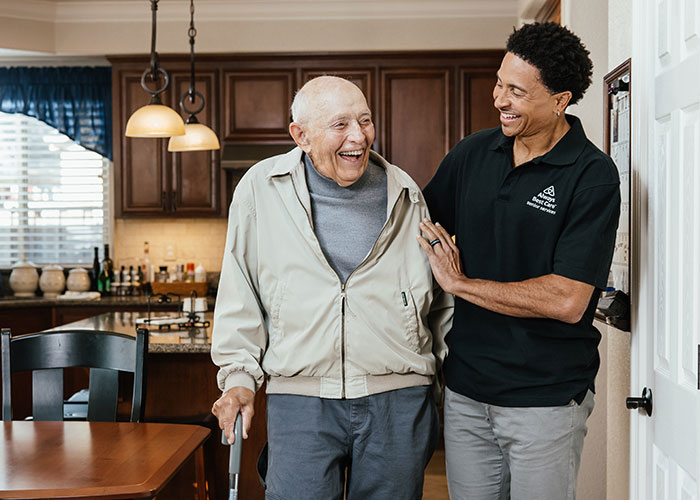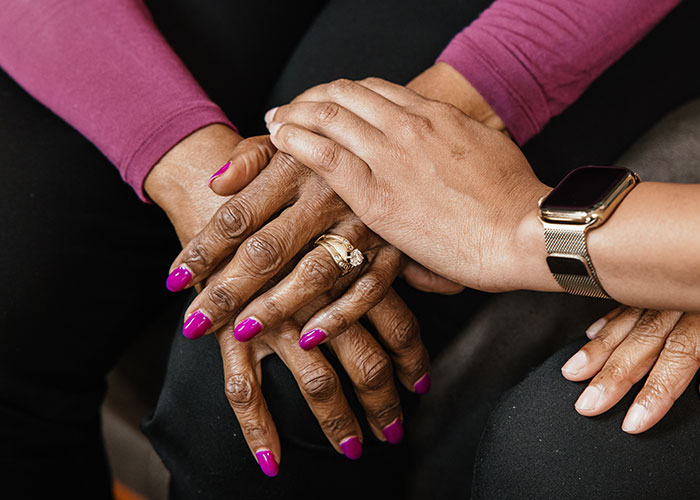What Is In-Home Nursing Care? [+ Key Benefits]
![What Is In-Home Nursing Care? [+ Key Benefits]](https://cdn.alwaysbestcare.com/wp-content/uploads/2024/06/in-home-nursing-care-hero-image.jpg)
A recent study found that 77% of adults aged 50 and older, prefer to stay in their homes long-term — a trend that has remained consistent for over a decade.
In addition, many of them want to monitor their health from the comfort of their homes, whether they’re recovering from a chronic condition or simply want to maintain their wellness as they age.
If you’re curious about how in-home nursing care can support these desires, it’s worth exploring what to expect during this transition.
We’ll cover everything you need to know about in-home nursing care, including its key benefits, and how an in-home nurse differs from a personal caregiver.
Plus, we’ll share how our in-home care services can help your elderly loved one maintain their independence while receiving the medical support they need right in the comfort of their home.
Table of Contents
What Is In-Home Nursing Care?
In-home nursing care encompasses a wide range of services tailored for elderly individuals who have been discharged from the hospital but still need ongoing monitoring or medical treatment from a nurse in their home.
In-home nursing care can be short-term, long-term, or schedule based.
What Is Caregiving?
Caregiving refers to providing support and assistance to elderly or disabled individuals who need help with daily activities and household tasks so they can maintain their independence and dignity.
Caregiving can also be short-term or long-term.
Home Care Nurse or In-Home Personal Caregiver: Which Should You Choose?
Not sure which service your elderly loved one needs?
We listed the key differences between an in-home nurse, or home care nurse, and an in-home personal caregiver to help you make an informed decision.
Home Care Nurse
- Medical expertise: After consulting with your loved one’s physician, a registered nurse will develop a care plan tailored to their needs. A home care nurse can be a licensed professional, such as a licensed practical nurse (LPN) or registered nurse (RN). They can provide services such as wound dressing, ostomy care, intravenous therapy, general health monitoring, and post-surgical care, among others.
- Medical conditions: Ideal for elderly individuals with medical conditions such as hypertension, who need professional health monitoring or complex medical treatments.
- Regulated: Nursing Regulatory Bodies (NRBs) regulate nurses ensuring they adhere to strict standards and maintain high levels of accountability.
In Home Personal Caregiver
- Non-medical assistance: These caregivers primarily help with daily living activities such as bathing, dressing, cooking, and light housekeeping.
- Companionship: They also offer companionship, which can greatly benefit an individual’s mental and emotional well-being.
- Flexibility and cost: In-home caregiver services are flexible in terms of hours and potentially less expensive than a licensed nurse. This makes them suitable for elderly individuals who need help with day-to-day tasks rather than medical care.
Benefits of In-Home Nursing Care
When an elderly loved one gets discharged from the hospital, it can be a hopeful yet challenging time for family members and friends.
In-home nursing care becomes invaluable upon their return, as familiar surroundings can aid healing and enhance recovery.
Whether your loved one is recovering from a prolonged illness, surgery, or fall, they can receive comprehensive health services in the comfort of their home.
Here are the numerous benefits that in-home nursing care offers:Here are the numerous benefits that in-home nursing care offers:
- Promotes healing and reduces the risk of infection: Being in familiar surroundings can speed up the healing process and minimize the chances of infections usually associated with extended hospital stays, such as urinary tract infection (UTI) or sepsis.
- More affordable than hospital care: Home nursing services tend to be more cost-efficient compared to prolonged hospital stays, helping families manage healthcare expenses.
- Leverages familiar surroundings: Being at home provides a sense of comfort and familiarity, which can significantly contribute to the overall well-being and comfort of your elderly loved one.
- Encourages personalized treatment: Home nursing allows for personalized care plans tailored to the individual needs of the elderly patient, ensuring they receive the specific treatment required for their recovery.
- Provides companionship: In addition to medical care, home nursing provides companionship and emotional support, reducing feelings of isolation and loneliness often experienced during the recovery period.

Factors To Consider When Choosing an In-Home Nurse
If you decide that an in-home nurse is the best option for your loved one’s care, here are some important factors to consider:
- Qualifications and experience: Verify the nurse’s qualifications, certifications, and experience, especially in dealing with medical conditions similar to your loved one’s. Look for specialized training in areas such as wound care, geriatrics, or chronic disease management.
- References and background checks: Request references from previous employers and conduct a thorough background check. This can include their employment history or disciplinary actions in their professional record.
- Compatibility: Consider the personality and communication style of the in-home nurse to make sure they are a good fit with your loved one’s temperament and communication preferences. A good rapport can significantly impact the quality of care and comfort.
- Availability: Confirm that the in-home nurse’s availability aligns with your loved one’s needs, including overnight or weekend care if needed.
- Services: Double-check if the in-home nurse can provide all the required services. This can include medication reminders, physical therapy, post-operative care, or other specialized medical care.
- Insurance and cost: Understand what your elderly loved one’s insurance covers and which expenses will be out-of-pocket.
- Well-informed about emergency procedures: Ensure the nurse is trained to handle emergencies and is knowledgeable about the specific health care protocols and resources in your area.
How to Prepare Your Loved One for In-Home Nursing Care
As your loved one transitions to in-home nursing care, it’s crucial to make sure they feel comfortable and informed about the upcoming changes.
To help your loved one prepare for in-home nursing care:
- Sit down with your elderly loved one and talk about the idea of bringing in an in-home nurse. Share why you think it’s a good move, but also make sure to listen to their thoughts and concerns.
- Set clear expectations with your elderly loved one. Outline what the in-home nurse will do, including the types of services they will provide and the schedule they will follow. This can help ensure everyone involved is on the same page.
- Arrange a meeting between your elderly loved one and their nurse before the first day of care, as a proper introduction can help ease anxiety and build trust.
- Prep your elderly loved one’s space. Set up a designated area in your loved one’s home for care, such as a first-floor guest room to avoid stairs, or an organized space with easy access to all necessary items for the nurse.
- Ensure all safety measures are in place, such as non-slip mats, safety bars in the bathroom, and smoke detectors and carbon monoxide detectors are working. This can help prevent accidents and make the home a safer environment for everyone, especially for those with limited mobility.
- Gather your elderly loved one’s information, such as medical history, current meds, allergies, and any special instructions to ensure the in-home nurse has all the necessary information.
- Respect your loved one’s need for privacy. Discuss how to handle personal care tasks respectfully and ensure that personal boundaries are maintained. For example, if your loved one is uncomfortable being fully undressed for baths or changing, you can suggest that the nurse helps them bathe with a towel or robe.
- Establish a system for updates and feedback between you, your loved one, and the in-home nurse. This includes daily logs, text messages, and regular end-of-day Zoom calls. Keeping everyone informed and engaged helps in making quick adjustments if your loved one’s needs change or if health concerns arise.

Explore Reliable In-Home Care Services and More at Always Best Care
At Always Best Care, we understand that selecting the ideal nurse for elderly care can be quite a challenge.
But here’s the good news: our team is ready to step in and offer professional in-home care services for your elderly loved one.
Our in-home care services provide around-the-clock assistance, including companionship, light housekeeping, laundry services, medication reminders, meal preparation, and end-of-life support, among other benefits.
With our reach across 225 territories, we’re here to ease the stress often felt by caregivers in search of the perfect senior care solution.
On top of caring for your loved one in the comfort of their home, we also provide other care services, including:
- Specialized home care services: We ensure daily social interaction for your loved one and provide insights about your loved one’s health right from their home.
- Skilled home health care services: We tailor care plans to fit your loved one’s specific recovery needs or health conditions. Available in select areas.
- Respite care services: Need a break? We’ve got you covered. We provide temporary care to give regular caregivers a rest, whether it’s just a few hours to several days, based on your needs.
- Dementia care services: We offer specialized care for loved ones with dementia, focusing on their comfort, safety, and overall well-being.
- Senior living referral services: If you’re looking for senior living options, we can guide you through choosing the best place for your loved one.
- Veterans assistance program: As our token of gratitude, we’re dedicated to giving veterans the best care and securing the funding they need.





